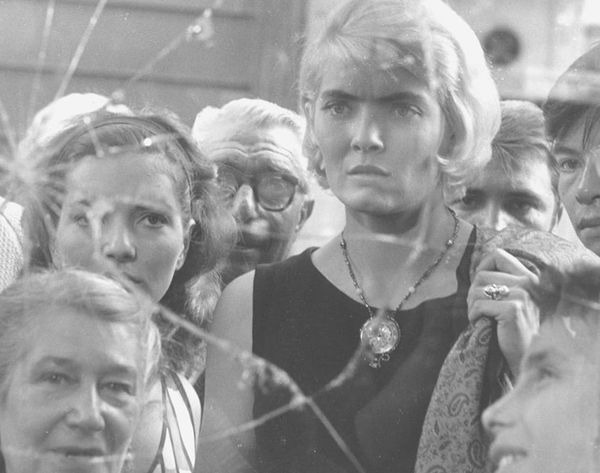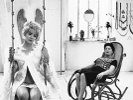Eye For Film >> Movies >> Cleo From 5 To 7 (1961) Film Review
Cleo From 5 To 7
Reviewed by: Jeff Robson

The French New Wave was undoubtedly one of the most ground-breaking movements in the history of cinema. But it was also a bit of a boys’ club – with one notable exception.
Agnes Varda deserves to be mentioned in the same breath as Godard, Truffaut et al. Marrying documentary-style realism to innovative and experimental camera techniques, she’s produced remarkable works such as Jacquot De Nantes and One Sings, The Other Doesn’t in a career spanning over half a century. And if, as she’s said herself, 2008’s autobiographical essay The Beaches Of Agnes is to be her last film, now’s as good a time as any to look back to where it all began.

The BFI obviously think so, too, kicking off a month-long retrospective with Cleo From 5 To 7 - her feature debut, and the film that first marked her out as a major talent.
The premise is deceptively simple – Cleo (Marchand) is a young, reasonably successful chanteuse living a seemingly gilded lifestyle in the Paris of the early Sixties. But on the day in question she’s waiting for the results of a medical examination and is afraid she may be diagnosed with cancer. In a striking opening sequence she visits a back-street fortune teller for a Tarot reading – and the omens aren’t good. From then on the film unfolds more or less in real time, taking us through the streets of Paris as a beautiful summer’s evening begins.
The bustle of the city and the rhythms of ordinary life are a symbol of, and contrast to, Cleo’s emotional turmoil as she waits for potentially life-changing news. Banal, routine events – she meets her friend and housekeeper Angele (Davray) in a café and they go shopping; she has a bad-tempered rehearsal with her composer (Legrand) – take on a new significance as Cleo begins to question the direction her life has taken and the image of herself that she’s allowed others to construct.
If you’re slightly wary of the image of French cinema as arty, soul-searching and ‘important’, this may sound a bit off-putting. But in fact this is a warm, engaging film that while undoubtedly intellectual is never pseudo-intellectual. At its heart is a character study of its protagonist and the way she treats the people around her. You may well find yourself muttering “slap her; she’s French” now and again, especially in the film’s early stages. But it soon becomes clear that Cleo’s tantrums and self-regard are a subtle dig at a strata of French life that, while considering itself hip and modern, is obsessed by status, image and outdated ideas of beauty and femininity.
Cleo’s decision to reject all this prompts some of the film’s most memorable images, as she leaves her apartment and roams the streets and parks restlessly, waiting for the time when she can pick up the results. Varda’s hand-held camera follows her every step of the way, creating a vivid, impressionistic picture of Paris in the hours between work and play.
Snatches of conversation and recordings of contemporary news broadcasts mingle with shots of street entertainers, café intellectuals and some Parisiens ordinaires clearly a bit bemused at having a camera turned on them. As an exercise in creating cinematic atmosphere it’s superb – you can almost smell the Gauloise fumes and the hot tarmac.
But it's also an intriguing snapshot of a society with one foot in the modern era – juke boxes, sports cars – but still retaining the slightly shabby, decadent feel of the belle époque. Superstition is also a strikingly significant element in the film. Virtually everything that happens to Cleo or her friends is a good or bad omen and the strictures on what she should or shouldn’t do to ensure good fortune in the run-up to the big news are taken for granted in a way that seems remarkable for a country in the second half of the 20th Century. It contrasts strikingly with the modernity of the film’s technique, and the new political era of which the film is acutely aware. Most of the film’s later stages concern Cleo’s chance encounter with Antoine (Bousellier), a young soldier on leave from Algeria. Varda was also associated with the Rive Gauche movement, which sought to bring Left-wing ideals to bear on all aspect of art, but she resists the temptation to make him a brute or a monster and he becomes a key source of comfort and companionship to Cleo as the moment of truth draws near...
At times the film is a little too self-consciously hip and avant garde – a silent film interlude featuring a ‘qui est qui’ of Nouvelle Vague luminaries is an overlong and not very funny in-joke – but such missteps are rare. Many filmmakers would be happy to have this as their crowning glory; considered as a debut it’s little short of astonishing.
As well as the technical accomplishments, Varda also coaxes great performances from her actors. Marchand – a singer, model and bit-part actress essaying her first major role – is a luminous screen presence and her journey from selfish fashion victim to independent, confident young woman is believable, human – and still very relevant. All the supporting players are equally impressive and Legrand (the Nouvelle Vague's go-to-guy for soundtracks, though perhaps best known for his work on the original Thomas Crown Affair) also contributes a swoony, atmospheric score.
In its collage of universal themes and everyday details, the works that Cleo From 5 To 7 resembles most are not so much films but poems like Eliot’s The Waste Land, or Joyce’s Dubliners short stories. High praise indeed, but deserved. In fusing technical innovation with old-fashioned regard for character and structure Varda created a very significant work. If you’re new to the Nouvelle, there are worse places to start. If not, light up a Gauloise, have a quick cognac and head to the nearest cinema to be reminded of a bunch of filmmakers who tried to be radical and entertaining at the same time – and made a pretty good job of it.
Reviewed on: 02 Apr 2010

















